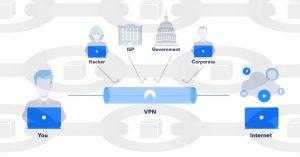Should I Use VPN for Cryptocurrency Transactions?

So, you’ve been trying to learn as much as possible about cryptocurrencies and how to keep them secure. That’s a smart move that is ignored by most. If you are also new to VPNs, you might wonder to what degree it helps to secure your cryptocurrencies. Is it helpful at all, and what should you do about it? This short guide is precisely about that – should you use VPN for cryptocurrency transactions?
Should I use a VPN for cryptocurrency transactions?
VPNs do improve your crypto security but only from the privacy side of things. As you may know, Bitcoin and other cryptocurrencies (except privacy coins) are not anonymous but pseudonymous. It makes it rather easy to track your financial activities once you go through a KYC/AML verification. After all, all transactions are stored on a distributed public ledger, and you also leave an IP footprint at crypto exchanges and other internet service providers.

A good privacy-oriented VPN service helps you to protect your identity from whoever wants to track you, be it hackers, a government agency, or a malicious third party. It is a commonly accepted fact that privacy is a fundamental human right amongst civilized people.
No one can steal your hard-earned money if they don’t know that it is you who owns it, which is why privacy is the ultimate security measure. Speaking of bitcoin and crypto security, you shouldn’t sweat it – all cryptocurrency protocols are designed with the highest level of security in mind and use end-to-end encryption.
Most exchange websites use HTTPS end-to-end encryption, too, so no one can intercept the data you send directly to them unless you’re exposed to critical security vulnerabilities. A VPN service adds an extra layer on top of that, which makes all of your web interactions more secure. These are the key reasons why you should use a VPN when working with cryptocurrencies:
- VPN encrypts the data you send through the network, making it harder to intercept.
- VPN adds another layer of security against malware, viruses, and phishing attacks.
- It hides your IP address to prevent IP tracking by hackers, government officials, and forensic analysis firms, so you can buy and sell crypto completely anonymously (if you avoid KYC/AML exchanges).
- A privacy-oriented VPN doesn’t store your logs and has a kill switch, which helps to maintain your anonymity. [*]Don’t fall for free VPNs for your crypto activities, as these service providers tend to fund themselves by selling your private data. If you are serious about your privacy and security, go for a paid VPN, as they are more reliable and secure.
Which VPN should I use for cryptocurrency transactions?
There is a sea of VPN providers out there, so it takes days of research to find the right one. Even so, not every service provider is reliable, especially when it comes to privacy and anonymity. If that’s your concern, you should look for a VPN with a strict no-logs policy and a kill-switch function.
No logs mean the service provider doesn’t collect your browsing data, so the activity remains completely private. Otherwise, your browsing activities are logged and can be turned over to governments with surveillance programs or sold to advertisers.
The kill-switch feature terminates your internet connection without exposing your IP address when there are connection issues between you and the VPN service. In other words, it prevents websites from accessing your real IP address in case of a VPN connection failure. That’s why it is vital for your privacy, too. Top-rated VPN providers typically come from states without mass surveillance programs.
For example, countries like the British Virgin Islands, Panama, and Switzerland don’t force VPNs to collect and store user data, which is somewhat liberating in today’s digital world. In contrast, many VPNs advertise themselves as privacy-oriented services only to hand over your private information when surveillance agencies request it.
Be wary of VPN services that are based in the United States, United Kingdom, Australia, New Zealand, and Canada, which are also known as the ‘Five Eyes‘ countries. The same goes for ‘free’ VPN services.
So which VPN is the best for cryptocurrency transactions? One of the most recommended VPNs out there is NordVPN. Based in Panama, it’s by far the most advanced and reliable VPN for cryptocurrency enthusiasts.

It has a strict no-logs policy, automatic kill-switch, DNS leak resolver, simultaneous protection for multiple devices, as well as related premium features like static IP, streaming services access, double encryption, and onion (Tor) over VPN.
Besides, like every privacy-respecting VPN provider, NordVPN accepts cryptocurrency payments. At the moment, you can pay for it using Bitcoin (BTC), Ethereum (ETH), Ripple (XRP), Litecoin (LTC), Dash (DASH), Monero (XMR), Zcash (ZEC), Tron (TRX), and BitTorrent (BTT) cryptocurrencies. NordVPN offers great deals, too. Right now, you can get an up to 68% discount if you sign up via this link.

Conclusion A reliable VPN is a handy privacy and anonymity tool for everyone who deals with cryptocurrencies. It’s not a compulsory security measure that will save you from all and any harm (like malware, hackers, and viruses) and cryptocurrencies are already secure as they are cryptographically encrypted by design, but it can definitely enhance your security and protect your identity.
Look for a no-logs VPN when choosing one, and don’t forget to support service providers who accept payments in cryptocurrencies. When used correctly, a privacy-oriented VPN becomes an invaluable instrument in your security toolset.
About Cryptonews
At Cryptonews, we aim to provide a comprehensive and objective perspective on the cryptocurrency market, empowering our readers to make informed decisions in this ever-evolving landscape.
Our editorial team, comprised of more than 20 professionals in the crypto space, works diligently to uphold the highest standards of journalism and ethics. We follow strict editorial guidelines to ensure the integrity and credibility of our content.
Whether you’re seeking breaking news, expert opinions, educational resources, or market insights, Cryptonews.com is your go-to destination for all things crypto since 2017.

 Kane Pepi
Kane Pepi